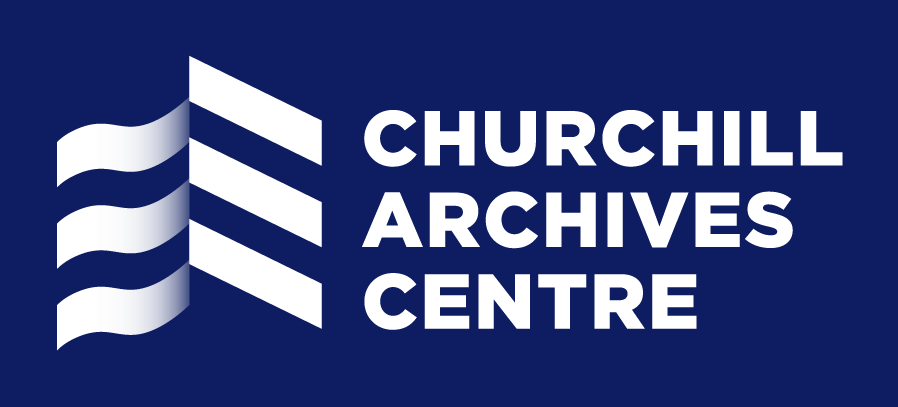Churchill College Archive Access Policy
1. Introduction
The Churchill College archive is stored in the Churchill Archives Centre and covered by the policies of that organisation. This access policy is in addition to the Churchill Archives Centre policy on access, freedom of information and data protection and covers types of material and circumstances that are unique to the college archive.
This policy is primarily for external researchers: there may be different access provisions for Members of the College. Please contact the College Archivist ([email protected]) for advice.
2. Closures within the college archive collections
We are keen that material in our care is open and accessible as far as possible. However, within some of our collections, some files or documents are closed and not available for consultation. The reasons for these closures generally fall into four categories:
2.1 Closed on data protection grounds due to the presence of personal data and sensitive/special category data about named individuals who are (or may be) still alive
Personal data (or personal information) is defined as: data or other information about a living person, who may be identified from it or combined with other data or information held. Some special category data are defined as information regarding an individual’s racial or ethnic origin; political opinion; religious or other beliefs; trade union membership; physical or mental health or condition; sexual life; criminal proceedings or convictions, as well as their genetic or biometric information.
Where a file clearly contains personal data, it is automatically closed for 75 years from the last date on the file. Access may be granted if the death of the individual concerned can be proven, or if access is requested by the individual whose personal data is in the file (see 3.1).
Types of material affected include, for example: student, staff and fellow files, salary and pension files, some committee papers (e.g. Fellowship Electors Committee).
It is possible that sensitive personal information about potentially-living individuals is not always closed in our collections. Readers are reminded that the registration form for a reader’s ticket includes the following undertaking:
I undertake to indemnify Churchill College against all claims and actions on the part of other persons arising out of the disclosure or publication by me in any other way of any matter taken from any archive in the Archives Centre which may be held to constitute a libel upon any person, or be an infringement of copyright or data protection legislation, or be a breach of confidence.
2.2 Closed due to commercial, financial or security issues or concerns of Churchill College
The Churchill College archive exists to preserve and make available the records of Churchill College and its members, and actively collects and seeks out new material with the aid of the college retention schedules. We are always keen to open as many types of material and files as possible. However, Churchill College feels that opening some types of material immediately could pose commercial, financial or security risks or concerns to the college and its members. For this reason, the following closure periods are applied automatically:
Commercial: records containing commercially-sensitive information will be automatically closed for 10 years from the last date in the file.
Financial: records containing financial information will be automatically closed for 75 years (if personal information is included) or for 10 years from the last date in the file.
Security: records containing information relating to the buildings, services, systems and security of Churchill College will be automatically closed for 25 years from the last date in the file. Advanced notice of requests to view plans of College buildings should be directed to the College Archivist.
Given these restrictions, all College committee agendas, minutes and papers will be open from the time of deposit with the exception of:
- minutes and papers that fall under the above closures,
- minutes and papers marked as confidential (closed for 10 years),
- minutes and papers from committees, which regularly discuss appointments or matters concerning individuals (closed for 75 years).
Please see Appendix 1 for further details.
Information that remains closed on Churchill College’s instructions has been supplied to the College archive and the Archives Centre in confidence and is therefore exempt from the provisions of the Freedom of Information Act 2000 (FoI Act).
2.3 Closed according to external donor’s wishes
The Churchill Archives Centre and the College archive exist to preserve and make available the raw material of our recent past. We are actively collecting and seeking to collect new material in line with our collecting policy. We are always keen to try and persuade donors to agree that collections should be open and accessible. However, owners sometimes feel that material in their collections has ongoing sensitivity and that they cannot agree to public access. Churchill Archives Centre also has a responsibility to posterity and, in order to secure the preservation of a collection which falls within its collecting policy, will agree to reasonable conditions that the donor feels are necessary. Information that remains closed on donors’ wishes has been supplied to the Archives Centre in confidence and is therefore exempt from the provisions of the FoI Act.
College employees (academic or non-academic) cannot apply wishes to records deposited in line with the College records retention schedules.
2.4 Uncatalogued material
The Churchill Archives Centre and the College archive are not able to provide access to entirely uncatalogued or unlisted collections. The main reasons for this are to ensure the security of the material; to package or repair material to make it physically safe to handle; and to preserve the original order of material.
3. Asking about closures in our collections
We are keen to respond as positively as possible to all enquiries (including data subject access requests and FoI requests) and would encourage you to seek further details about information which is closed for the reasons outlined above. Let us know what you need and we will try to help. We may be able to do the following:
3.1 Review material closed on data protection grounds.
People have a right to see information about themselves: if you think that we may have information about you, please get in touch so that we can check this for you.
3.2 Check donors’ wishes
This may give us a valuable opportunity to revisit the terms under which a collection was given to the Centre and check that sensitivities identified at the time of deposit are still an ongoing concern.
3.3 Check records for you
Under certain circumstances, Archives Centre staff may be able to check records on behalf of researchers, including boxes in closed and uncatalogued collections, and documents where their inherent fragility prohibits access on conservation grounds, and to provide a summary of the information contained in the records. The Archives Centre may have to make a charge to cover the cost of such research, and would always advise the research of such charges before they were incurred.
4. Appeals and complaints
The Information Commissioner’s website contains details of how you can appeal against a refusal to provide information. Before you appeal to the Information Commissioner, please use our internal complaints procedures by contacting:
Data Protection Lead
Churchill College, Storey’s Way
Cambridge, CB3 0DS
Telephone: 01223 336000
Email: [email protected]
Reviewed by: Hannah James, Records Manager & College Archivist
Date: 2021
Appendix 1: Active Churchill College committees and their closure periods
| Committee | Closed (years) |
|---|---|
| Archives Committee | 75 |
| Audit Committee | 10 |
| Board of Discipline | 75 |
| Chapel Trustees | 75 |
| Churchill College Association | 0 |
| Churchill Conferences Ltd | 10 |
| Churchill Residences II Ltd | 10 |
| College Council (open) | 0 |
| College Council (confidential) | 10 |
| Combined College Rooms Finance Committee | 0 |
| Committee on Amendments to Statutes, Ordinances and Regulations | 0 |
| Communications Working Party | 0 |
| Development Board | 10 |
| Directors of Studies Committee | 0 |
| Donations to Charities Committee | 0 |
| Education Committee | 0 |
| Endowment Grants Committee | 10 |
| Equality, Diversity and Inclusion Committee | |
| Estates Committee | 25 |
| Ethics Committee | 0 |
| Fellows’ Rooms Committee | 75 |
| Fellowship Electors Committee | 75 |
| Finance Committee | 10 |
| Governing Body | 0 |
| Hanging Committee | 0 |
| Heads of Departments Committee | 75 |
| Health and Safety Committee | 25 |
| House Committee | 25 |
| Information and Communications Strategy Committee | 0 |
| Investment Advisory Committee | 10 |
| Junior Common Room Committee | 0 |
| Library Committee | 0 |
| Management Advisory Committee | 10 |
| Middle Common Room Committee | 0 |
| Moller Centre Board | 10 |
| Moller Centre Continuing Education Committee | 10 |
| Panel of the Disciplinary Committee (Academic Staff) | 75 |
| Remuneration Committee | 75 |
| Senior Common Room Committee | 0 |
| Small Grants Committee | 0 |
| Staff Consultative Committee | 0 |
| Staff Disciplinary Committee | 75 |
| Staff Grievance Committee | 75 |
| Student Academic Appeals Committee | 75 |
| Student Disciplinary Appeals Committee | 75 |
| Sustainability Committee | 0 |
| Tutorial Committee | 75 |
| Wine Committee | 0 |

